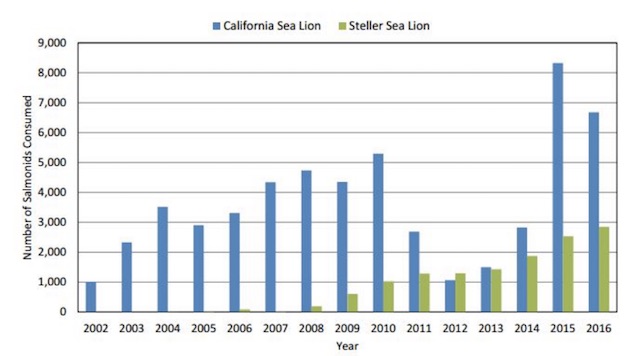forum
library
tutorial
contact

Predatory Sea Lions Are Detrimental
to Columbia River Fish Runs
by Gerry Lewis and Paul Ward
NW Fishletter, May 1, 2017
|
the film forum library tutorial contact |

|
Predatory Sea Lions Are Detrimental
by Gerry Lewis and Paul Ward
|
 Studies by the National Marine Fisheries Service, and corroborated by our biologists and those employed by the states of Oregon and Washington, show that predatory sea lions are having an absolutely detrimental impact on the fish runs that so many in our region depend on.
Studies by the National Marine Fisheries Service, and corroborated by our biologists and those employed by the states of Oregon and Washington, show that predatory sea lions are having an absolutely detrimental impact on the fish runs that so many in our region depend on.
At least 20 percent of returning spring Chinook runs are being taken by sea lions.
Those who suggest that sea lions eating fish near Bonneville Dam represents a natural phenomenon are not familiar with either the normal habitat of sea lions or of the hard-fought compromises that so many in the Columbia Basin have reached in order to try and have a productive fishery.
While sea lions can survive in freshwater, they are predominantly saltwater mammals. Their home is the Pacific Ocean. Twenty years ago we did not have a problem with large numbers of sea lions swimming 145 miles up the Columbia to Bonneville Dam to gorge themselves on salmon.
This is a learned behavior by a limited number of sea lions that has been taught to others of their species.
The argument that this is natural behavior is also blind to the fact man has changed the Columbia through the construction of dams, through polluting the river, through diversion of massive amounts of water, and through the destruction of thousands of miles of fishery habitat.
We cannot pretend that this is just nature at work, when man has altered the natural balance that might have otherwise made it a fair fight. Now the fish are at too great a disadvantage for the well-intended, but naïve, protectors of sea lions to say that man should butt out of the sea lion versus salmon issue.
All parties involved in the Columbia Basin fish issues have had to compromise. The treaty tribes, who ceded millions of acres that now comprise large segments of Washington, Oregon and Idaho, and who reserved to themselves the right to fish as we have since time immemorial, have had to greatly reduce our fishery so that the species may survive. Commercial and sports fishermen have had to do likewise.
The operators of hydro dams have had to give up power production in order to spill water so that the species may survive.
Agriculture interests, in some of the most fertile lands in the United States, have had to curtail the irrigation of their crops and fruit trees so that sufficient water is left in the tributaries so that the species may survive.
Ratepayers have had to pay millions for fish mitigation.
All have had to sacrifice, and yet certain groups say we should take no actions against sea lions.
We appreciate their wanting to protect sea lions, but where is their interest in protecting salmon and steelhead and those whose lives are so dependent on them?
The lack of understanding regarding the pressures on fishery managers and the insensitivity to our rights is astonishing, particularly when suggesting Indians and others should simply stop fishing.
Managing the salmon and steelhead species in the Columbia is a complicated balancing act, but to recommend that sea lions should be exempt from that balancing act is naïve at best.
Related Pages:
House Natural Resources Committee Passes Bill to Expedite Sea Lion Removal by CBB Staff, Chinook Observer, 10/14/16
learn more on topics covered in the film
see the video
read the script
learn the songs
discussion forum
